
Supporting VETS from Camp Lejeune
Have you ever had a day that completely disrupted your direction in life?
For me, that day was July 17, 2017. It was the day that I faced an overwhelming reality that the person I love could be taken from me.
You see, on July 17th 2017 my wife was diagnosed with stage 3 multiple myeloma. It is a non-curable terminal cancer, a blood cancer. At the time my wife was admitted 90% of her bone marrow was compromised by the cancer. The cancer had caused bone lesions from the top of her skull, throughout her ribs, and down through both femurs. She was severely anemic and in renal failure. The medical staff made it clear that if she was not there that evening, she would not have survived the night.
I guess with any cancer people might speculate on the cause. But in my wife’s case we knew the cause. It was contaminated water at a military facility. My wife was one of over 50,000 veterans stationed at Camp Lejeune NC who had developed cancer in a period April of 2017 through May 2018.
The water at Camp Lejeune NC had been contaminated from 1953 through 1987. Exposure to the water can cause one or more of 15 brutal conditions several years after the exposure.
In 2012 legislation was established requiring the veterans’ administration to be fully accountable for the healthcare related to any of the 15 known medical conditions. Unfortunately the process for inspiring the VA to comply with the law is a whole different story.
In my wife’s case, a VA oncologist was not made available for nine months after her diagnosis.
My wife needed treatment to keep her alive, but the VA was unable to provide it.
So treatment was provided at a private hospital and billed to the VA as a secondary coverage.
Yet in spite of the VA’s unavailability and the legislation requiring them to cover her care, the VA has denied all claims submitted to them.
I assume many camp Lejeune veterans share a similar experience. They are diagnosed with a severe condition requiring immediate life saving measures. The VA is unable to provide service in a timely manner, or the veteran may not be enrolled to VA healthcare.
I cannot imagine how any single veteran could afford the cost of inpatient stays, cancer treatment, and loss of income when afflicted with any of the brutal conditions caused by the water at Camp Lejeune. Not every veteran has insurance. The cost of wife’s first inpatient stay was billed out at over $200,000, and each weekly chemo treatment was over $22,000.
The veterans affected by camp Lejeune water exposure can be dealing with the harsh news of a terminal condition. They may have debilitating effects of cancer. And many deal with loss of income during extended inpatient stays.
Not a single one of them should have to battle the VA for coverage and payments on top of everything else.
These people served our country and many of them have been left to fall through the cracks by the very country they served.
Over the past years I have been advocating for my wife. Now I have I launched this campaign along with a website to provide a resource for any veteran affected by Camp Lejeune water contamination.
Regardless of your ability to provide a donations, I ask that you share this information. There are veterans and family members suffering emotionally, physically, and financially from this issue.
If you know someone that had been stationed at camp Lejeune, You can find more information to support the veterans of Camp Lejeune at www.lejeunesupport.com .
The following conditions are linked to Camp Lejeune water contamination.
Individuals exposed to the water no less than 30 days between 1953 through 1987 may develop one or more of the following conditions.
Bladder cancer*
Breast cancer
Esophageal cancer
Female infertility
Hepatic steatosis
Kidney cancer*
Leukemia*
Lung cancer*
Miscarriage
Multiple myeloma*
Myelodysplastic syndromes* (Aplastic anemia)
Neurobehavioral effects
Non-Hodgkin's lymphoma*
Parkinson's disease*
Renal toxicity
Scleroderma